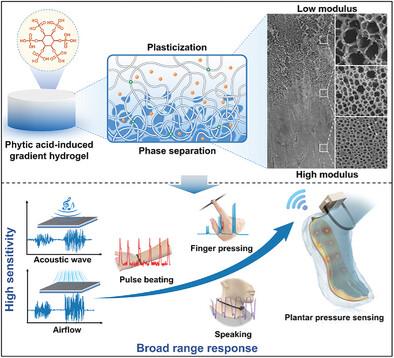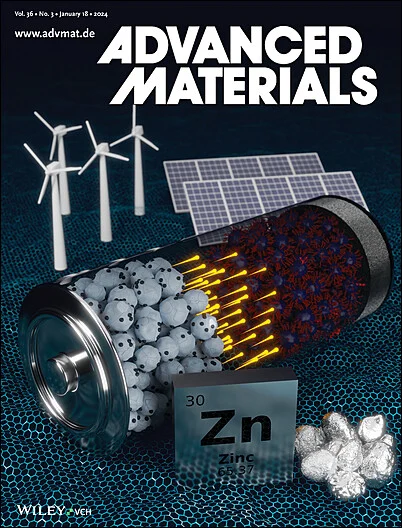Phytic Acid-Induced Gradient Hydrogels for Highly Sensitive and Broad Range Pressure Sensing
IF 27.4
1区 材料科学
Q1 CHEMISTRY, MULTIDISCIPLINARY
引用次数: 0
Abstract
Ionic conductive hydrogels have emerged as an excellent option for constructing dielectric layers of interfacial iontronic sensors. Among these, gradient ionic hydrogels, due to the intrinsic gradient elastic modulus, can achieve a wide range of pressure responses. However, the fabrication of gradient hydrogels with optimal mechanical and sensing properties remains a challenge. In this study, it is discovered first that phytic acid (PA) interacts in remarkably distinct manners (i.e., plasticizing effects and phase separation) with different polymers (i.e., polyacrylamide and polyacrylic acid). This distinctive PA-polymer interacting mechanism is innovatively utilized to construct a modulus gradient ionic hydrogel through a simple precursor solution infiltration approach. The gradient hydrogel-based flexible pressure sensor not only achieves a high sensitivity (9.00 kPa−1, <15 kPa) and a broad sensing range (from ≈3.7 Pa to 1.2 MPa) simultaneously, but also exhibits superior low pressure sensing performance. It successfully recognizes the subtle pressure due to acoustic waves and airflow, as well as the moderate pressure due to speaking and finger pressing and the high magnitude of plantar pressure. In addition, the gradient hydrogel demonstrates remarkable antibacterial properties and biocompatibility. This functional hydrogel with excellent sensing performance and bioactivity exhibits exceptional potential for wearable sensing applications.

求助全文
约1分钟内获得全文
求助全文
来源期刊

Advanced Materials
工程技术-材料科学:综合
CiteScore
43.00
自引率
4.10%
发文量
2182
审稿时长
2 months
期刊介绍:
Advanced Materials, one of the world's most prestigious journals and the foundation of the Advanced portfolio, is the home of choice for best-in-class materials science for more than 30 years. Following this fast-growing and interdisciplinary field, we are considering and publishing the most important discoveries on any and all materials from materials scientists, chemists, physicists, engineers as well as health and life scientists and bringing you the latest results and trends in modern materials-related research every week.
 求助内容:
求助内容: 应助结果提醒方式:
应助结果提醒方式:


